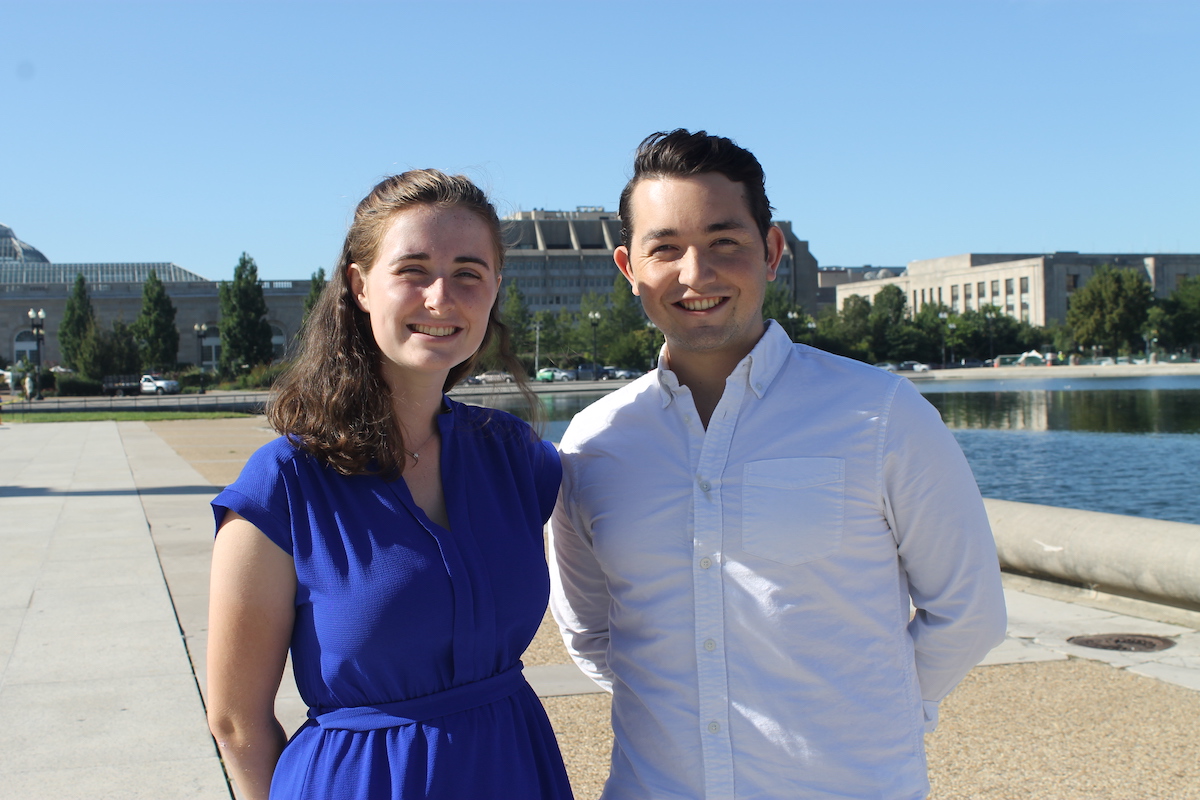(Above: Riley Link, right, and Sebastian Hickey, Portland, Oregon, December 2019.)
26th Class Emerson Fellows Riley Link and Sebastian Hickey are in Portland, Oregon, for the field placement portion of their fellowships. Riley is placed with Partners for a Hunger-Free Oregon, and Sebastian is placed with the Welcome Home Coalition.

A moody day in Portland, Oregon. Photo: Orlova Maria
Riley Link
Somewhere near Ohio last summer, I awoke to an email that my field placement would be with Hunger-Free Oregon in Portland, Oregon. It felt as though the stars had aligned. Two weeks prior, I had left my New Jersey home by bike, pedaling towards Portland to fundraise for a food justice organization with The Dream Project. Suddenly, that seemingly random destination had meaning. When I triumphantly arrived at my placement with Hunger-Free Oregon in Portland, my first reaction was the private vindication of stereotypes being confirmed – Portlandia was accurate! This city really was keeping it weird.
My new coworkers quickly added some much-needed nuance to my understanding of my new home. In my first week, they sent me the article “Oregon Was Founded as A Racist Utopia.” Oregon was the only state whose constitution explicitly “forbade black people from living, working, or owning property there. It was illegal for black people to even move to the state until 1926.” It’s not a coincidence that in 2019 only 2 percent of Oregon’s population is black1 .
The exclusionary constitution isn’t remarkable because Oregon is exceptionally racist, but as an explicit example of the racist foundations of our country as a whole. Hunger-Free Oregon recognizes that ending hunger means understanding that historic racism, along with the racism that we still perpetuate, causes the inequities we see today. Our responsibility is to actively combat this legacy in our work and policy goals. As a white transplant in a state where white transplants have been displacing people since the days of the Oregon Trail, I have to determine what my own responsibilities and role are.
In recognition of racial inequities in food security, this year Hunger-Free Oregon helped pass legislation to ensure that Oregon students have the farthest-reaching access to school meals in the country. This legislation mandated that schools in low-income areas serve breakfast after the bell and established two innovative school meal reimbursement options, which may be models for other states. My goal is to ensure that these new policies, especially breakfast after the bell, are effectively implemented prior to the 2020-2021 school year. My work includes interviewing nutrition service directors, creating resources to advise schools, providing problem solving via technical assistance, and shaping the regulations through the state rule-making process.
Diving deep into the challenges of implementing legislation has taught me about the importance of intentionality. Even for this exciting and thoughtfully-designed policy, translating law into practice is difficult. My role means that everything, from particular wording in the regulations, to the way a school develops a breakfast implementation plan, has consequences. In our personal day-to-day, that means we need to be deeply aware of potential negative consequences of our decisions. Especially given that our negative consequences tend to most affect people of color. I’ve been immensely grateful for coworkers who consistently encourage each other to practice intentionality in our decision-making. We ask: Where is our focus? What would be most transformative? And perhaps most importantly, who is missing from this table? In this project, we’ve repeatedly returned to a question about what authentic community engagement should look like and how to avoid simply using it as an amorphous buzzword.
Especially in the government and school administrative processes that dominate this project, decision-making power rarely lies with those most impacted by the policies. Community engagement means figuring out how to transfer some of that power and using my own power intentionally. Personally, I’ve found that being aware of my limited resources from the start, including my time-limited fellowship position, has helped me prioritize my work more strategically. For example, knowing that the dramatic inequities in Oregon schools often mirror racial inequalities, my team and I decided our outreach should specifically target schools with large populations of students of color.
As I approach the end of my work in this green City of Roses I’m thinking about which learnings I will carry forward in my life and work. One lesson I’m internalizing is that if something as small as a word in a regulation or sending a coworker an article has consequences, then it is my responsibility to be as intentional as possible in all my decision-making and to share my own power. This lesson that we all can create some consequences–and that we better be intentional about it–pulls me towards accountability.

Riley and Sebastian in Washington, D.C., before setting off for their field placements, August 2019
Sebastian Hickey
During our field site training in Washington, D.C., one of our speakers, Emerson Hunger Fellow alum Jeremiah Lowery (’12-’13), posed two questions that have guided my time at the Welcome Home Coalition in Portland, Oregon: How are you making a sustainable impact in your field site community? How are you going to make sure your experience is not extractive, but is in fact creating benefit beyond the tenure of your stay?
One of the first things that attracted me to the Emerson Fellowship was the combination of a placement at a local community organization and a national policy organization. It is a unique and privileged opportunity to learn about anti-hunger and anti-poverty work in the U.S. from these two perspectives. Well-intentioned actors operating at 10,000 feet run the risk of undermining work at the community level because they are removed from the issues they are trying to solve. By working for six months in each context, Emerson Fellows have the chance to be a bridge between those two worlds. It is exciting to embark on such a unique journey, but in the field placement, the short time frame comes with additional responsibility. As a temporary resident of that place, a Fellow’s challenge is to use their capacity in ways that improve their placement’s ability to serve the community beyond their fleeting tenure.
With Welcome Home I have sought to empower people with lived experience in housing insecurity to use their stories to advocate for housing policy reform. Housing issues are connected intimately to hunger, not only for houseless people, but for the many families and individuals who compromise on food in order to pay rent. The Welcome Home Coalition advocates for regional policies that increase the supply of affordable housing and remove barriers to housing for individuals and families. Just as important, it uses community education and leadership development to raise the voices of people with lived experience in housing insecurity. I work with two culturally-specific partner organizations to develop networks of housing advocates in each community: Bienestar, a non-profit housing developer that builds affordable homes for Latinx families, and the Somali Empowerment Circle, a network of Somali and Somali-American community members in the Portland region.
The work of centering marginalized voices is hugely important in America’s whitest major city. Portland’s communities of color have historically been denied the opportunities its white population was entitled to. Native Americans were removed from the land, Black Exclusion Laws barred African-Americans from owning it, and immigrant laborers from Asia, Mexico, and Central America have been exploited for decades. The modern manifestations of these inequities can be observed in Portland’s affordable housing crisis. Disparities exist at all levels of the housing continuum: at all income levels, Black and Hispanic Oregonians were far more likely than white Oregonians to receive high-cost subprime loans and therefore were at greater risk of losing their home during the Great Recession2. For renters, there is not a single neighborhood in the city where the average Black, Hispanic, and Native American households can affordably pay the median rent3. African-Americans and Native Americans are heavily over-represented in the city’s homeless population4. Although in recent years Portland and the state of Oregon have taken significant steps to address the housing crisis, it remains essential that policy makers contend with the equity impacts of policy decisions and listen to vulnerable communities.
With Bienestar and the Somali Empowerment Circle I am developing toolkits to train community members to be advocates for affordable housing. Working in collaboration with each organization, we are creating a curriculum for teaching community members about the causes of the affordable housing crisis and how they can use their own stories to promote housing reform. Lead advocates from each organization will facilitate the workshops for community members. These efforts aren’t geared towards a specific policy goal; instead we hope to equip community members with the skills and knowledge to advocate for the changes in housing policy they feel their community needs. At the culmination of the series of workshops, we will invite elected officials to come to the community and listen to people’s stories.
The process of developing these workshops with the organizations has highlighted the importance of building trusted relationships in anti-poverty work. There are so many key relationships which depend on trust for success: trust between the cultural organizations and Welcome Home, trust between those organizations and their community members, trust between the organizations and me. From my end, that trust is strengthened through how I represent Welcome Home at our meetings and the quality of work I produce. I have also become more cognizant of the trust that I must have in my partners. For this community advocacy project to endure and be legitimate, the leadership and energy has to come from the community. To that end it is my responsibility to make space so that community members can step up and lead this project. Growing these relationships is amongst the most important contributions to Welcome Home’s work I can leave behind.
Portland, the City of Roses, is undeniably beautiful. When you stand on the eastern bank of the Willamette River and look westward, the lush, piney green of the surrounding hills gives way to the gleaming skyscrapers of downtown. Turn your gaze east and the volcano Wy’east (Mt. Hood) stands solemnly on the horizon, capped white with snow. Many people are attracted to this place because it inspires a vision of a better American city. The city’s beauty can sometimes disguise the harm and inequality occurring here, but its citizenry’s appetite for change makes me hopeful. My time with Welcome Home has been an education and I will continue to grow during my final months here. I hope that I can do my part to help Portland be a place where everyone has a safe and affordable place to call home.
- U.S. Census Bureau Quick Facts: Oregon, United States. https://www.census.gov/quickfacts/fact/table/OR,US/PST045218 [↩]
- Oregon Center for Public Policy: “OCPP Finds Racial Pattern in Oregon’s Subprime Lending,” January 31st, 2008. [↩]
- Portland Housing Bureau: “State of Housing in Portland,” December 2016 [↩]
- Center for Social Innovation: “SPARC Phase One Study Findings,” March 2018 [↩]

